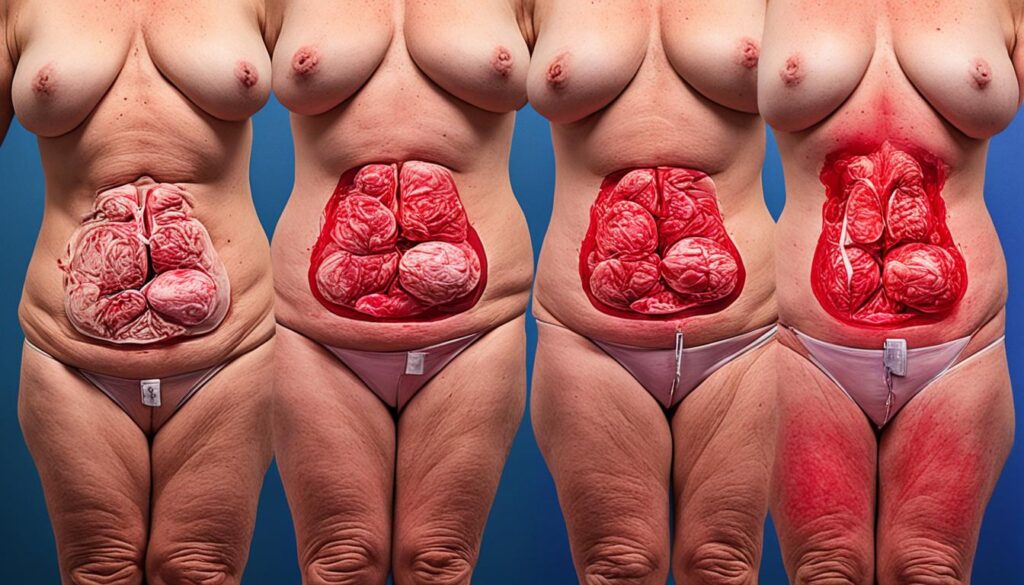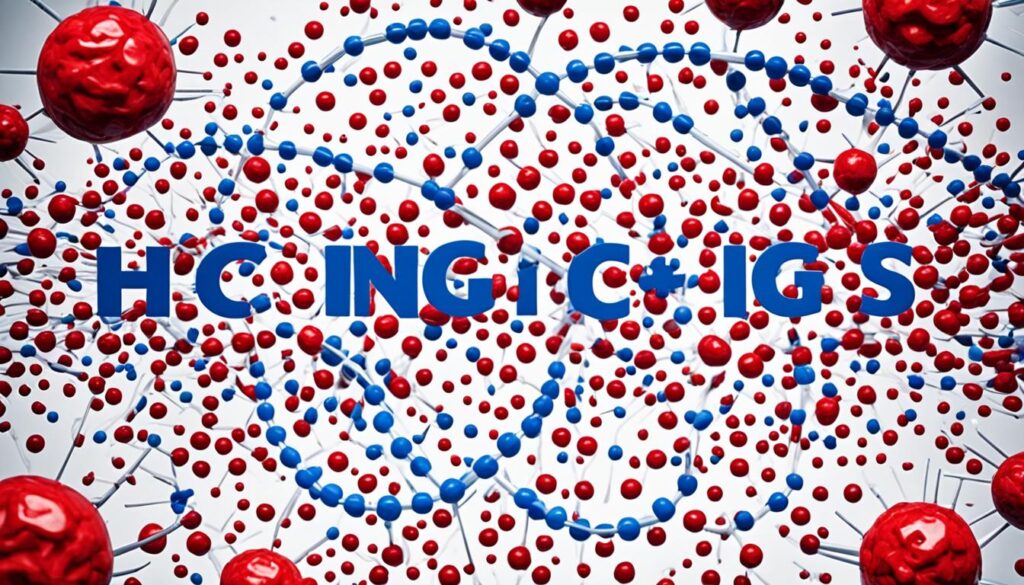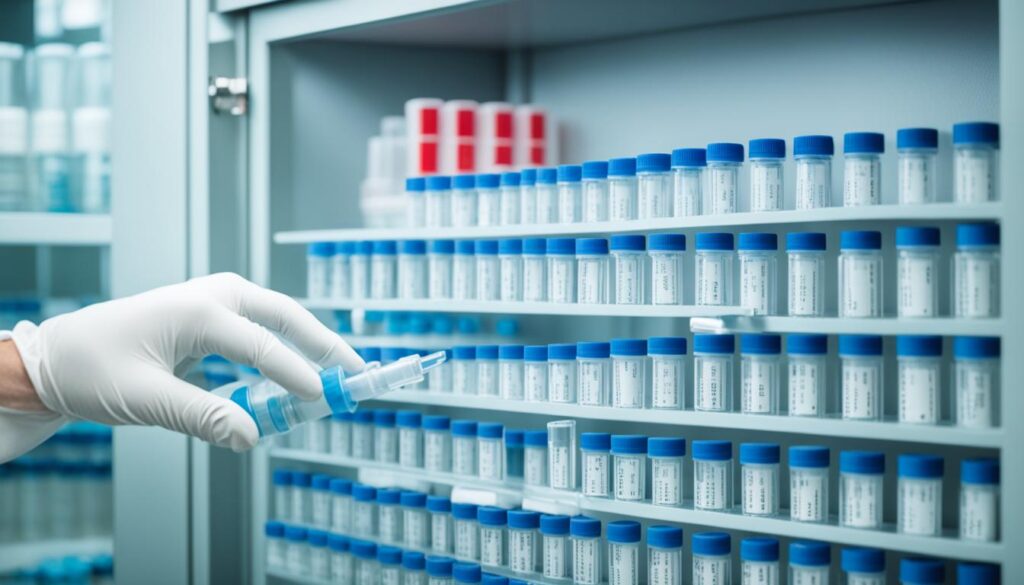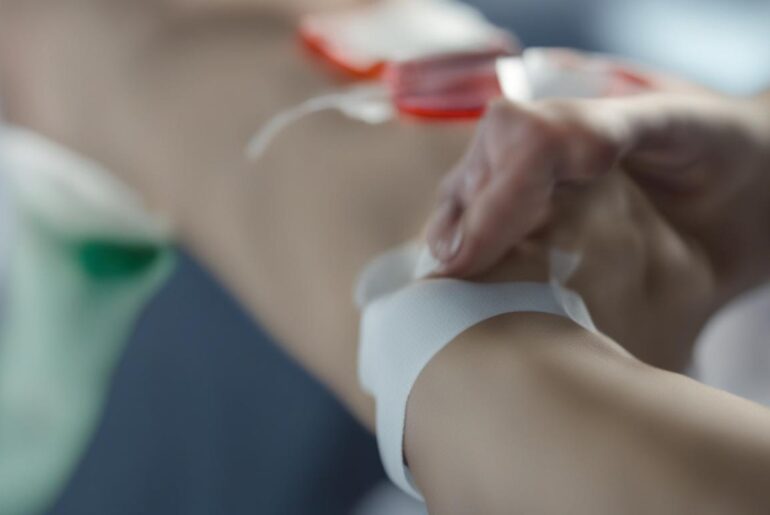Did you know that weight-loss products containing HCG have raised concerns about their potential to cause blood clots? The use of HCG injections for weight loss has gained popularity in recent years, but the safety of this approach is a subject of debate. Let’s take a closer look at the relationship between HCG injections and blood clots, as well as the potential risks and side effects associated with their use.
Key Takeaways:
- HCG injections have been questioned for their potential to cause blood clots.
- The FDA advises against the use of over-the-counter weight-loss products containing HCG.
- Severe calorie restriction, a common aspect of the HCG diet, can lead to various risks and side effects.
- The use of HCG injections for weight loss is not approved by the FDA.
- Consulting with a healthcare provider is crucial for safe and effective weight loss methods.
Understanding HCG Injections and Their Uses
HCG injections are commonly prescribed for treating fertility issues in both men and women, playing a vital role in reproductive health. In females, HCG can help with infertility, while in males, it can assist in treating a type of hypogonadism. Also known as the “pregnancy hormone,” HCG is essential for maintaining pregnancy and supporting the development and growth of the fetus.
For men, HCG injections have shown potential benefits in stimulating the production of testosterone and sperm, which may aid in reducing infertility. Some doctors may prescribe HCG as an alternative to testosterone products for individuals with testosterone deficiency, such as those transitioning female-to-male (AFAB) or seeking fertility preservation. HCG therapy can help increase testosterone levels, improve sexual function, and promote fertility.
It is important to note that while HCG injections have demonstrated effectiveness in certain areas of reproductive health, there is limited clinical research on the effects of HCG injections in men with low testosterone levels. Further studies are needed to establish comprehensive evidence and guidelines for HCG usage in different contexts.
Risks and Side Effects
Like any medical treatment, HCG injections may come with potential risks and side effects. It is crucial to discuss any concerns or pre-existing medical conditions with your healthcare provider before starting HCG therapy.
Common side effects of HCG injections can include the following:
- Headache
- Restlessness
- Mild swelling
- Depression
- Fatigue
- Breast tenderness
- Pain at the injection site
While these side effects are generally mild and temporary, it is important to be aware of them and report any unusual or bothersome symptoms to your healthcare provider.
Important: Always consult with a healthcare provider for personalized advice and to discuss specific benefits and risks related to your individual circumstance.
Moreover, there are possible risks associated with HCG injections, such as the formation of blood clots. Blood clotting, also known as thrombosis, can be a serious and potentially life-threatening condition. It is important to be vigilant and seek immediate medical attention if you experience symptoms such as pain, warmth, redness, numbness, or tingling in the arms or legs, as these could indicate a blood clot.
| Potential Benefits | Potential Risks and Side Effects |
|---|---|
| Beneficial for fertility issues | Risk of blood clotting (thrombosis) |
| Supports testosterone and sperm production | Mild side effects such as headache and pain at the injection site |
| Promotes fertility in men and women | Risk of ovarian hyperstimulation syndrome (OHSS) in women |
Risks and Side Effects of HCG Injections

HCG injections, like any medication, come with potential risks and side effects that need to be considered. While these side effects may not occur in all cases, it is important to be aware of them before undergoing HCG treatment. Common side effects of HCG injections include:
- Gynecomastia: In some individuals, HCG injections can lead to the growth of male breasts. This is a condition known as gynecomastia and can be a cause of concern for many.
- Pain at the injection site: It is common to experience some pain or discomfort at the site where the HCG injection is administered. This is usually temporary and subsides over time.
- Stomach pain, nausea, and vomiting: Another possible side effect of HCG injections is stomach pain, along with feelings of nausea and vomiting. These symptoms may vary in intensity and duration.
In rare cases, HCG injections have been associated with the formation of blood clots in the body, which can be a serious and potentially life-threatening condition. It is important to be aware of the symptoms of a blood clot, such as pain, warmth, redness, numbness, or tingling in the arms or legs. If you experience any of these symptoms, seek immediate medical attention.
Another potential side effect of HCG injections, especially in women undergoing fertility treatment, is ovarian hyperstimulation syndrome (OHSS). OHSS is a condition characterized by the overstimulation of the ovaries, leading to symptoms such as abdominal pain, bloating, and fluid retention. In severe cases, OHSS can be life-threatening and may require medical intervention.
It is important to discuss the potential risks and side effects of HCG injections with your healthcare provider before starting treatment. Your healthcare provider will be able to provide you with more detailed information and guidance based on your individual circumstances.
Expert Insight:
“While HCG injections can be an effective treatment option for certain medical conditions, it is crucial to be aware of the potential risks and side effects. Blood clot formation, although rare, can occur as a result of HCG use. It is important to closely monitor your symptoms and seek medical attention if you experience any concerning signs, such as pain or swelling in the arms or legs.”
Dr. Emily Johnson, MD
HCG Injections for Weight Loss
Some individuals turn to HCG injections as a potential solution for weight loss, often in conjunction with the HCG diet. However, it is crucial to note that the FDA has not approved HCG for weight loss purposes, and there is a lack of substantial evidence supporting its effectiveness in this context.
The HCG diet typically involves extreme calorie restriction, with individuals consuming as low as 500 to 800 calories per day. While this drastic reduction in calorie intake may lead to temporary weight loss, it is important to question the role of HCG in this process. The effectiveness of HCG itself in promoting weight loss remains questionable. Furthermore, it is essential to consider the potential risks and side effects associated with such restrictive diets.
One potential risk is the formation of gallstones, which can occur due to rapid weight loss. The limited calorie intake can also lead to electrolyte imbalances, potentially resulting in problems such as muscle cramps and irregular heart rhythms. Severe calorie restriction may also cause arrhythmias, which can pose serious health risks.
When considering weight loss strategies, it is vital to consult with a healthcare provider who can offer safe and evidence-based methods. A healthcare professional can provide guidance, support, and personalized recommendations to help achieve weight loss goals effectively and safely.
Unproven Effectiveness of HCG Injections for Weight Loss
“While some individuals may experience weight loss on the HCG diet, it is important to recognize that this weight loss is likely due to the severe calorie restriction rather than the impact of HCG injections. It is essential to prioritize evidence-based approaches and consult with healthcare professionals.”
– Dr. Sarah Johnson, MD
The Risks of Restrictive Diets
Extreme calorie restriction, as seen in the HCG diet, can have detrimental effects on the body. Limiting calorie intake to such low levels can lead to nutritional deficiencies, muscle loss, weakness, and fatigue. It is also important to remember that these restrictive diets are not sustainable in the long term and often result in weight regain once normal eating patterns are resumed.
The key to successful and sustainable weight loss lies in a balanced and individualized approach that incorporates healthy eating habits, regular physical activity, and behavior modification. By focusing on overall lifestyle changes, individuals can achieve long-term weight management and improved overall health.
Before embarking on any weight loss journey, it is advisable to consult with a healthcare provider who can offer evidence-based guidance and support tailored to individual needs and goals.
Safe Usage of HCG Injections

When it comes to the safe usage of HCG injections, it is crucial to follow the guidance of a healthcare provider. While HCG therapy can be beneficial for certain individuals, it may not be suitable for everyone. It is important to consider any existing medical conditions or allergies before starting HCG treatment.
If you have prostate cancer, specific brain cancers, uncontrolled thyroid disease, or known allergies to hamster protein (HCG is produced from hamster ovary cells), HCG injections should not be used. These conditions can potentially increase the risks associated with HCG therapy.
It is essential to inform your doctor about your medical history, including any pre-existing conditions, to ensure the safe usage of HCG injections. Your healthcare provider will be able to determine if HCG therapy is appropriate for you or if alternative treatments should be considered.
Additionally, pregnant individuals should avoid using HCG injections, as HCG is not approved for use during pregnancy. It is important to prioritize the well-being of both the mother and the developing fetus by discussing safe and appropriate treatment options with a healthcare provider.
| Medical Conditions | Safe Usage of HCG Injections |
|---|---|
| Prostate cancer | No |
| Specific brain cancers | No |
| Uncontrolled thyroid disease | No |
| Allergies to hamster protein | No |
| Pregnancy | No |
Prescription and Administration of HCG Injections
HCG injections are a prescribed medication that should be administered under the guidance of a healthcare professional. These injections are typically given either under the skin or into muscle tissue. One common application of HCG injections is addressing testosterone deficiency in individuals who are assigned male at birth (MAAB) and may experience symptoms such as reduced libido, fatigue, and mood changes due to low testosterone levels. In such cases, HCG can be prescribed alongside testosterone products to help improve symptoms and maintain fertility.
During the course of HCG treatment, regular monitoring and follow-up appointments with a healthcare provider are crucial to ensure the effectiveness and safety of the therapy. It is important to discuss any concerns or questions with your healthcare provider and follow their instructions carefully regarding the timing and dosage of the injections.
Benefits of Combining HCG Injections with Testosterone
The combination of HCG and testosterone can have various potential benefits for individuals with testosterone deficiency. Some of these benefits include:
- Increased testosterone levels: HCG injections can stimulate the body’s production of testosterone, helping to restore levels to a healthier range.
- Improved sexual function: Testosterone deficiency can lead to reduced libido and sexual dysfunction. By addressing the deficiency, HCG injections may help improve sexual function and overall sexual health.
- Enhanced fertility: Testosterone plays a crucial role in sperm production. By increasing testosterone levels, HCG injections can aid in addressing infertility concerns in men with testosterone deficiency.
It is important to note that the use of HCG injections for testosterone deficiency should only be done under the supervision and guidance of a healthcare professional. Regular monitoring of hormone levels and overall health is essential to ensure the proper administration of HCG injections.
Monitoring Hormone Levels and Health during HCG Treatment
Throughout the course of HCG treatment, it is vital to monitor hormone levels and overall health to ensure the effectiveness and safety of the therapy. Regular blood tests will be conducted to evaluate hormone levels and make any necessary adjustments to the treatment plan.
In addition to monitoring hormone levels, healthcare providers will also assess your overall health and well-being during HCG treatment. This may involve evaluating any potential side effects or complications and determining if any adjustments are needed.
| Parameters to Monitor | Frequency of Monitoring |
|---|---|
| Hormone levels (testosterone and others) | Regularly throughout the treatment |
| Overall health and well-being | Ongoing throughout the treatment |
| Potential side effects | During follow-up appointments |
Regular communication with your healthcare provider is crucial during HCG treatment. It is important to inform them about any changes in your health, including new symptoms, side effects, or concerns. Your healthcare provider will work closely with you to ensure the proper administration of HCG injections and monitor your progress throughout the treatment.
Possible Interactions and Precautions

When considering the use of HCG injections, it is crucial to inform your healthcare provider about all the medications you are currently taking. This includes prescription drugs, over-the-counter medications, vitamins, and herbal supplements. Certain medications have the potential to interact with HCG injections, which can affect their effectiveness or increase the risk of side effects.
In addition to medication interactions, it is important to take precautions if you have other medical conditions. Your healthcare provider needs to know if you have thyroid or adrenal disorders, ovarian cysts, unexplained vaginal bleeding, heart disease, kidney disease, epilepsy, migraines, or asthma. These conditions may require special consideration or adjustments to your HCG treatment plan.
Your doctor will determine the appropriate dosage and treatment plan based on your individual circumstances. By providing them with a complete picture of your current medications and medical history, you can ensure that your HCG injections are safe and effective for you.
Common Medications that May Interact with HCG Injections
| Medication Class | Potential Interaction |
|---|---|
| Anticoagulants (e.g., Warfarin) | Increased risk of bleeding |
| Anti-seizure medications (e.g., Phenytoin) | Reduced effectiveness of HCG |
| Diabetes medications (e.g., Insulin) | Changes in blood sugar levels |
| Corticosteroids (e.g., Prednisone) | Increased risk of fluid retention and electrolyte imbalances |
| Thyroid medications (e.g., Levothyroxine) | Altered thyroid hormone levels |
“It is essential to prioritize open and honest communication with your healthcare provider to ensure the safe and effective use of HCG injections.”
Proper understanding of drug interactions and potential risks can help you make informed decisions regarding your HCG treatment. Always consult with your healthcare provider and inform them of any changes in your medications or medical history to minimize the chance of adverse interactions and maximize the benefits of HCG injections.
Proper Usage and Storage of HCG Injections

When it comes to using HCG injections, proper usage and storage are vital for ensuring safety and effectiveness. Following the prescribed guidelines provided by your healthcare provider is essential in maximizing the benefits of HCG injections for your specific needs.
Administration at Home
If you are administering HCG injections at home, it is crucial to follow the specific instructions provided by your doctor, nurse, or pharmacist. Pay close attention to the dosage, injection technique, and frequency of administration. If you have any doubts or questions, do not hesitate to reach out to your healthcare provider for clarification.
Disposal of Needles and Syringes
Proper disposal of used needles and syringes is essential not only for your safety but also to prevent injuries to others. Dispose of these items in a puncture-resistant container, such as a sharps disposal box, to reduce the risk of accidental needle sticks. It is important to check with your local authorities or healthcare facility for guidance on proper disposal methods in your area.
Storage Guidelines
HCG injections should be stored according to the manufacturer’s instructions, typically in a refrigerator. This helps maintain the stability and potency of the medication. Make sure to store HCG injections away from direct light and heat sources to prevent degradation. Additionally, keep them out of reach of children and pets to avoid accidental exposure.
Expiration and Unused Medication
It is essential to check the expiration date on the packaging of HCG injections. Using expired medication can lead to a decrease in effectiveness or potential harm. Any mixed medicine, such as reconstituted HCG solutions, should be used within the designated time frame specified in the instructions, usually 30 days. If you have any unused or expired medication, consult your pharmacist or healthcare provider for proper disposal methods.
| Key Points |
|---|
| Follow the specific administration instructions provided by your healthcare provider |
| Dispose of used needles and syringes in a puncture-resistant container |
| Store HCG injections in a refrigerator, away from light and heat sources |
| Check the expiration date and use mixed medicine within the designated time frame |
| Properly dispose of any unused or expired medication |
By following the proper usage and storage guidelines for HCG injections, you can ensure their effectiveness and minimize the risk of complications. If you have any concerns or questions about using HCG injections, consult with your healthcare provider for personalized guidance and support.
Potential Side Effects of HCG Injections

Like any medication, HCG injections can potentially cause side effects. It is important to be aware of these possible side effects and monitor your body’s response to the treatment. Some of the common side effects associated with HCG injections include:
- Headache: Some individuals may experience headaches as a result of HCG injections.
- Restlessness: Restlessness or difficulty sleeping can be a potential side effect of HCG injections.
- Mild swelling: You may experience mild swelling at the injection site, which typically resolves on its own.
- Depression: In some cases, HCG injections can contribute to feelings of depression or mood changes.
- Fatigue: Fatigue or a general feeling of tiredness may occur as a side effect of HCG injections.
- Breast tenderness: HCG injections can sometimes lead to tenderness or enlargement of the breasts.
- Pain at the injection site: It is not uncommon to experience some discomfort or pain at the injection site.
If you notice any of these side effects and find them bothersome or unusual, it is important to reach out to your healthcare provider. They can assess your condition and provide guidance on managing these side effects or adjusting your treatment if necessary.
While these side effects are generally mild and temporary, it is crucial to be aware of any severe symptoms or signs of an allergic reaction. Seek immediate medical attention if you experience symptoms such as hives, difficulty breathing, or swelling of the face, lips, tongue, or throat.
Can HCG Injections Cause Weight Loss?
It is important to note that HCG injections are not approved by the FDA for weight loss purposes. The use of HCG for weight loss is often associated with the HCG diet, which involves both injections and severe calorie restriction. While the diet may result in temporary weight loss, the effectiveness of HCG itself in promoting weight loss is not supported by substantial evidence. It is crucial to consult with a healthcare provider for safe and effective weight loss methods.
If you’re considering HCG injections for weight loss, it’s essential to understand the limitations and potential risks involved. While some people may experience weight loss on the HCG diet, it’s important to remember that severe calorie restriction can have negative effects on your overall health and well-being.
Instead of relying solely on HCG injections, I recommend working with a healthcare professional to develop a comprehensive and sustainable weight loss plan. This may include a balanced diet, regular exercise, portion control, and behavior modification strategies.
Remember, weight loss is a journey, and it’s important to prioritize your long-term health and well-being. Seeking professional guidance can help you make informed decisions and achieve your weight loss goals in a safe and sustainable manner.
Before starting any weight loss program, always consult with your healthcare provider to ensure it is appropriate for your individual needs and medical history.
The HCG Diet: Potential Risks and Limitations
The HCG diet, which combines HCG injections with severe calorie restriction, has gained popularity in recent years. However, it’s important to understand the potential risks and limitations associated with this approach.
While some individuals may experience rapid weight loss on the HCG diet, this is likely due to severe calorie restriction rather than the effects of HCG itself. The diet typically restricts daily calorie intake to as low as 500-800 calories, which is significantly below the recommended daily intake for most adults.
Severe calorie restriction can lead to a number of negative side effects, including fatigue, dizziness, muscle loss, nutrient deficiencies, and a slowed metabolism. It can also be challenging to sustain such a low-calorie diet in the long term, making weight regain likely once normal eating habits resume.
Another consideration with the HCG diet is the potential for muscle loss. Severely restricting calorie intake can cause the body to break down muscle tissue for energy, resulting in a loss of lean muscle mass rather than just fat.
Furthermore, the long-term effects of the HCG diet on overall health and well-being are not well-studied or understood. It’s important to approach any weight loss plan with a focus on balanced nutrition, regular physical activity, and mental well-being.
If you’re considering the HCG diet or any other weight loss program, I strongly recommend consulting with a healthcare professional to ensure that it is safe and appropriate for you. They can provide personalized guidance and support to help you achieve your weight loss goals in a healthy and sustainable way.
Comparison of Different Weight Loss Methods
| Weight Loss Method | Effectiveness | Safety | Sustainability |
|---|---|---|---|
| HCG Injections | Minimal evidence to support weight loss | Potential risks and side effects | Difficult to sustain long-term |
| Healthy Balanced Diet | Effective with proper nutrition | Safe and sustainable | Can be maintained long-term |
| Regular Exercise | Contributes to weight loss | Safe when done correctly | Integral part of a healthy lifestyle |
| Behavior Modification | Aids in sustainable weight loss | Safe and effective | Equips individuals with lifelong skills |
Conclusion
In conclusion, the use of HCG injections has been associated with potential risks, one of which is the formation of blood clots. While HCG injections are primarily prescribed for treating fertility issues and testosterone deficiency, they are not recommended for weight loss purposes. The HCG diet, which involves severe calorie restriction, may lead to temporary weight loss. However, this restrictive diet also carries the risk of gallstone formation, vitamin and mineral deficiencies, and electrolyte imbalances.
When considering weight loss methods, it is crucial to consult with a healthcare provider to explore safe and effective options. It is important to be aware of the potential side effects and interactions associated with HCG injections. In some cases, HCG injections may not be suitable for individuals with certain medical conditions or allergies. Your healthcare provider can provide tailored advice and guidance based on your specific circumstances.
Remember that maintaining a healthy weight should be approached holistically, with a focus on balanced nutrition, regular physical activity, and lifestyle modifications. It is essential to prioritize your overall well-being and consult with healthcare professionals to make informed decisions about your weight loss journey.
FAQ
Can HCG injections cause blood clots?
While rare, there have been instances where HCG injections have been associated with the formation of blood clots. It is important to be aware of the potential risks and consult with a healthcare provider.
What are the risks and side effects of HCG injections?
Some potential risks and side effects of HCG injections include gynecomastia (growth of male breasts), pain at the injection site, stomach pain, nausea, vomiting, blood clots, and ovarian hyperstimulation syndrome (OHSS).
Can HCG injections be used for weight loss?
The FDA has not approved HCG injections for weight loss purposes. The use of HCG for weight loss is often associated with the HCG diet, which involves severe calorie restriction. However, the effectiveness of HCG itself in promoting weight loss is questionable.
How should HCG injections be administered?
HCG injections should be administered as instructed by a healthcare professional. They are typically given as injections under the skin or into muscle tissue. Regular monitoring and follow-up appointments are necessary during HCG treatment.
Are there any precautions or interactions associated with HCG injections?
HCG injections should not be used by individuals with certain medical conditions or allergies. It is important to inform your healthcare provider about all medications, including prescription drugs, over-the-counter medications, vitamins, and herbal supplements, to prevent any potential interactions or complications.
How should HCG injections be stored?
HCG injections should be stored according to the manufacturer’s instructions, typically in a refrigerator. Any mixed medicine should be used within the designated time frame, and any unused or expired medication should be properly disposed of.
What are the potential side effects of HCG injections?
Potential side effects of HCG injections can include headache, restlessness, mild swelling, depression, fatigue, breast tenderness, and pain at the injection site. It is important to report any unusual or bothersome symptoms to your healthcare provider.
Can HCG injections cause weight loss?
The use of HCG injections for weight loss is not recommended. While the HCG diet may result in temporary weight loss, the effectiveness of HCG itself in promoting weight loss is not supported by substantial evidence.




